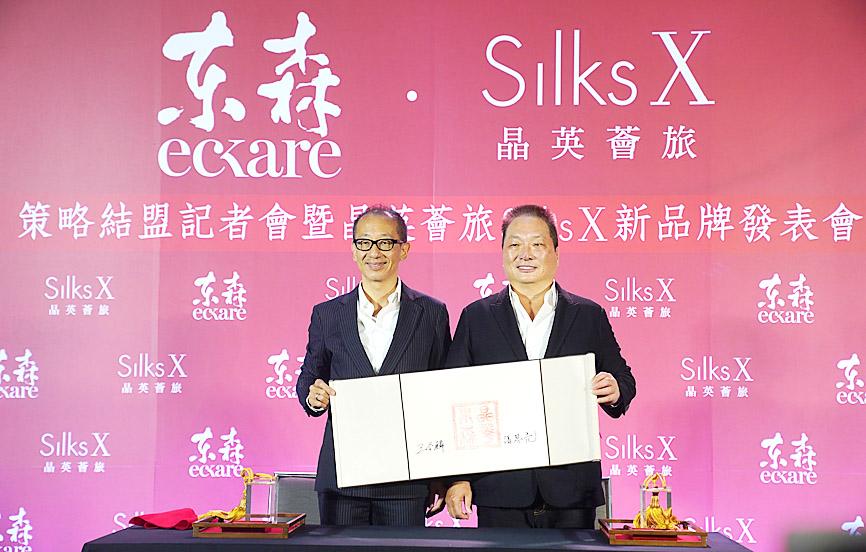Eastern Media International Corp (EMG, 東森國際) yesterday signed a management contract with Formosa International Hotels Corp (FIH, 晶華國際酒店集團) to open a hotel under the Silks X brand that could start operations in 2025.
The e-commerce and home shopping operator is to build the hotel in a mixed-use complex near the Taiwan Taoyuan International Airport MRT line’s Linkou Station with a budget of NT$1 billion (US$35.37 million), EMG chairman Gary Wang (王令麟) told a news conference.
The hotel of 200 guest rooms would occupy the 26th to 33rd floors of a complex under construction, which would also house movie theaters, retail stores, banquet facilities and office space for the group’s beauty and direct sales arms, Wang said.

Photo: CNA
EMG owns e-commerce platform ETMall (東森購物), Hong Kong-listed Natural Beauty Bio-Technology Ltd (自然美), and warehouses at the Taichung and Kaohsiung harbors for the storage of agricultural products. It also has a business that imports grain and consumer electronic products.
Wang said that he aims to turn the complex into a local version of Cannes, France, with the assistance of the adjacent Mitsui Outlet Park (三井) and Sanlih Entertainment Television (三立), which is developing a mixed-use complex in the neighborhood.
EMG is to pour NT$12 billion into building the complex, which could attract 10 million visitors and generate more than NT$8 billion in revenue per year, Wang said.
“You cannot find hotels in Cannes or Hollywood that generate losses,” Wang said. “There will more likely be a shortage of rooms after the complex’s construction.”
The Silks X hotel is not the first time that EMG has ventured into the hospitality business, as the group owns unprofitable resort properties, one in Yilan and another in Taoyuan.
However, EMG plans to leave them idle for the moment, Wang said, adding that real-estate properties in good locations tend to increase in value over time.
Wang said that EMG partnered with FIH because he is a loyal customer at the Regent Taipei (台北晶華酒店), FIH’s flagship property, and would give the hotel group complete control in designing, decorating and operating the Silks X.
FIH chairman Steve Pan (潘思亮) said that the Silks X would be the first in the post-pandemic era, after COVID-19 played havoc on the hospitality industry worldwide.
FIH, which operates nearly 1,000 guestrooms across Taiwan under the Silks Place, Wellspring and Just Sleep brands, created a new brand to suit EMG’s new property that is to feature fun, fashion and vitality.
While it is premature to set room rates for Silks X, Pan said that the hotel would doubtless have the highest rates in New Taipei City.
FIH is to open a new Just Sleep in Tainan next quarter, and is in talks over more properties across Taiwan and overseas, Pan said.
Hotels in the greater Taipei area are likely to continue to struggle this year amid international travel bans, but things might return to normal next year, Pan added.

IN THE AIR: While most companies said they were committed to North American operations, some added that production and costs would depend on the outcome of a US trade probe Leading local contract electronics makers Wistron Corp (緯創), Quanta Computer Inc (廣達), Inventec Corp (英業達) and Compal Electronics Inc (仁寶) are to maintain their North American expansion plans, despite Washington’s 20 percent tariff on Taiwanese goods. Wistron said it has long maintained a presence in the US, while distributing production across Taiwan, North America, Southeast Asia and Europe. The company is in talks with customers to align capacity with their site preferences, a company official told the Taipei Times by telephone on Friday. The company is still in talks with clients over who would bear the tariff costs, with the outcome pending further

A proposed 100 percent tariff on chip imports announced by US President Donald Trump could shift more of Taiwan’s semiconductor production overseas, a Taiwan Institute of Economic Research (TIER) researcher said yesterday. Trump’s tariff policy will accelerate the global semiconductor industry’s pace to establish roots in the US, leading to higher supply chain costs and ultimately raising prices of consumer electronics and creating uncertainty for future market demand, Arisa Liu (劉佩真) at the institute’s Taiwan Industry Economics Database said in a telephone interview. Trump’s move signals his intention to "restore the glory of the US semiconductor industry," Liu noted, saying that

STILL UNCLEAR: Several aspects of the policy still need to be clarified, such as whether the exemptions would expand to related products, PwC Taiwan warned The TAIEX surged yesterday, led by gains in Taiwan Semiconductor Manufacturing Co (TSMC, 台積電), after US President Donald Trump announced a sweeping 100 percent tariff on imported semiconductors — while exempting companies operating or building plants in the US, which includes TSMC. The benchmark index jumped 556.41 points, or 2.37 percent, to close at 24,003.77, breaching the 24,000-point level and hitting its highest close this year, Taiwan Stock Exchange (TWSE) data showed. TSMC rose NT$55, or 4.89 percent, to close at a record NT$1,180, as the company is already investing heavily in a multibillion-dollar plant in Arizona that led investors to assume

AI: Softbank’s stake increases in Nvidia and TSMC reflect Masayoshi Son’s effort to gain a foothold in key nodes of the AI value chain, from chip design to data infrastructure Softbank Group Corp is building up stakes in Nvidia Corp and Taiwan Semiconductor Manufacturing Co (TSMC, 台積電), the latest reflection of founder Masayoshi Son’s focus on the tools and hardware underpinning artificial intelligence (AI). The Japanese technology investor raised its stake in Nvidia to about US$3 billion by the end of March, up from US$1 billion in the prior quarter, regulatory filings showed. It bought about US$330 million worth of TSMC shares and US$170 million in Oracle Corp, they showed. Softbank’s signature Vision Fund has also monetized almost US$2 billion of public and private assets in the first half of this year,